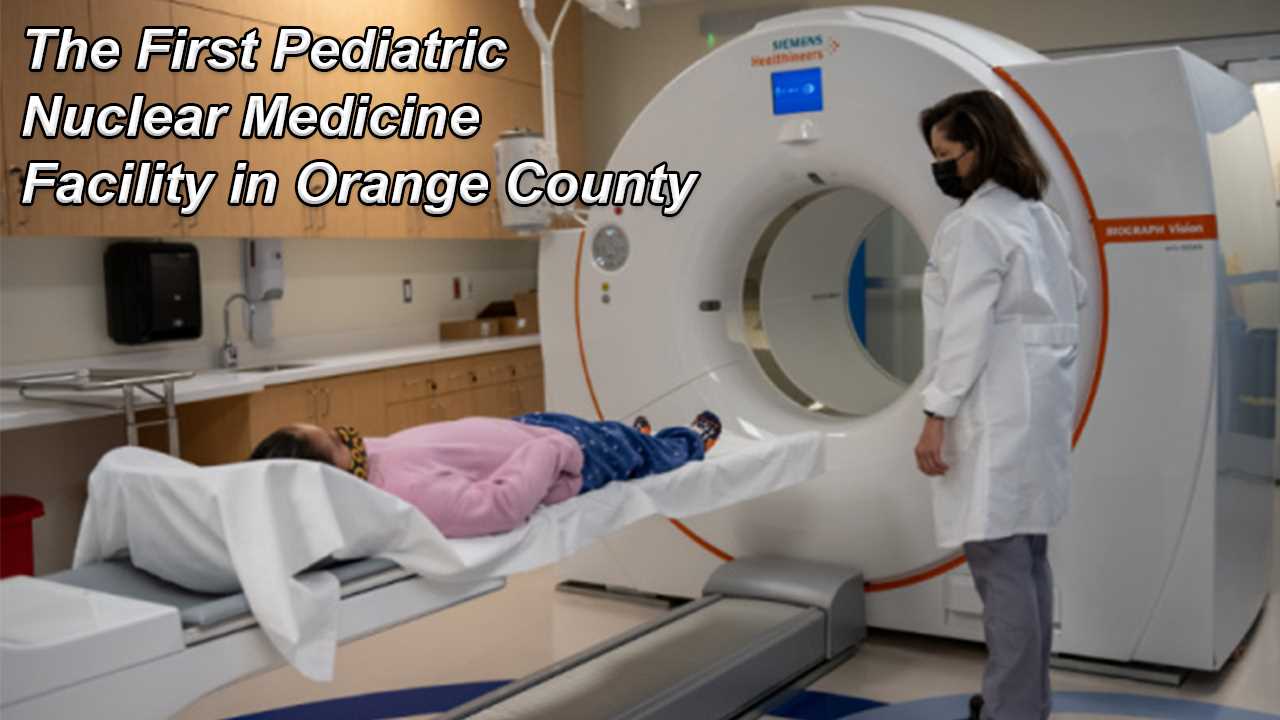CHOC Opens First Pediatric Nuclear Medicine Facility in Orange County
Michael Peters
Thursday, December 30, 2021

Children’s Health of Orange County is pleased to announce the opening of a nuclear medicine suite inside its hospital campus in Orange. It is the
This hybrid machine performs pet scans and CT scans. One example of use for this room is for monitoring of the progress of chemotherapy for patients with cameras.
only pediatric nuclear medicine program in Orange County and completes a full suite of radiology offerings in a healing environment dedicated to children and their families.
The 4,000-square-foot facility, located in CHOC Hospital’s Bill Holmes Tower, allows pediatric patients to undergo advanced diagnostic imaging with treatments and protocols specialized for children.
“When parents are faced with a diagnosis for their children that requires additional testing and diagnostic imaging, they want to go to the best place – and CHOC has designed just that,” said Dr. Azam Eghbal, pediatric radiologist and medical director of radiology at CHOC. “Our patients require special equipment made for kids and the expertise and experience to interpret pathological findings unique to pediatrics. We at CHOC are here to meet that important need.”
Years of research show adult-sized radiation doses are unnecessary to obtain quality images in children. To that end, CHOC calibrates all imaging procedures and equipment for children and has established protocols to reduce radiation exposure while still capturing high-quality images. CHOC radiology routinely meets or exceeds national radiation safety recommendations.
“At CHOC, we understand that children are not just small adults,” says Dr. Hollie Lai, a pediatric radiologist and director of nuclear medicine at CHOC. “That’s why our nuclear medicine protocols and treatments are tailored just for kids. CHOC is the only nuclear medicine program in Orange County dedicated specifically to pediatrics. All of our equipment is calibrated so that children receive smaller and safer doses of radiation.”
Nuclear medicine is a noninvasive procedure used to assess and diagnose many conditions.
Imaging produced by nuclear medicine is very precise and cannot be replicated by other exams. A pediatric radiologist examines these images to help identify diseases and conditions in their early stages. Common nuclear medicine tests and treatments include:
Bone scans identify changes in joints, bones and tumors. It can also be used to find causes of pain or inflammation.
Ictal Single Photon Emission Computed Tomography (SPECT) images specific areas of the brain and measures blood flow to find where seizures start.
MIBG Scan is used for the localization of known or suspected neuroectodermally derived tumors, including pheochromocytoma, ganglioneuroma, ganglioneuroblastoma, paraganlioma, carcinoid tumor and neuroblastoma.
Radioiodine treatment is targeted radiation therapy used to treat thyroid conditions.
Renal scans are used to find abnormalities in the kidneys such as problems with function or blood flow.
Single Photon Emission Computed Tomography combined with Computed Tomography (SPECT/CT) scans are two different technologies used together to improve the effectiveness and convenience of imaging.
Thyroid scans are used to evaluate thyroid function and assess nodules and masses.
Positron emission tomography combined with Computed Tomography (PET/CT) scans are two different technologies used together to improve the effectiveness and convenience of imaging. It is an essential tool in the development of cancer treatment plans, evaluating recurrence of cancer and assessing the effectiveness of chemotherapy.
CHOC nuclear medicine program's holding area
One of two in the space, this holding area is where patients are prepped for their procedures. A child may begin their nuclear medicine infusion in the chair. The beautiful child-friendly artwork is designed to provide peace and distraction to patients during an injection.
Because nuclear medicine can diagnose and track the progress of multiple conditions, the program supports the needs of multiple specialties offered at CHOC, including critical care, neurology, neurosurgery, oncology, urology, endocrinology and orthopedics. With a foundational knowledge of medical imaging and expertise, CHOC’s pediatric nuclear medicine physician partners with other specialists like neurology and oncology to treat many of today’s toughest medical problems.
CHOC’s nuclear medicine team includes experienced and board-certified pediatric radiologists, anesthesiologists, dual-licensed nuclear medicine/computed tomography technologists, radiology nurses, and child life specialists.
The environment in the nuclear medicine suite is soothing, calm and kid-friendly. Additionally, a special sound system is available to help patients feel more comfortable.
The new nuclear medicine facility further augments the robust offerings in the Radiology Department at CHOC Hospital, which include Computed Tomography (CT or CAT) scan; fluoroscopy; interventional radiology; Magnetic Resonance Imaging (MRI); ultrasound; and X-Rays
This hybrid machine performs pet scans and CT scans. One example of use for this room is for monitoring of the progress of chemotherapy for patients with cameras.
only pediatric nuclear medicine program in Orange County and completes a full suite of radiology offerings in a healing environment dedicated to children and their families.
The 4,000-square-foot facility, located in CHOC Hospital’s Bill Holmes Tower, allows pediatric patients to undergo advanced diagnostic imaging with treatments and protocols specialized for children.
“When parents are faced with a diagnosis for their children that requires additional testing and diagnostic imaging, they want to go to the best place – and CHOC has designed just that,” said Dr. Azam Eghbal, pediatric radiologist and medical director of radiology at CHOC. “Our patients require special equipment made for kids and the expertise and experience to interpret pathological findings unique to pediatrics. We at CHOC are here to meet that important need.”
Years of research show adult-sized radiation doses are unnecessary to obtain quality images in children. To that end, CHOC calibrates all imaging procedures and equipment for children and has established protocols to reduce radiation exposure while still capturing high-quality images. CHOC radiology routinely meets or exceeds national radiation safety recommendations.
“At CHOC, we understand that children are not just small adults,” says Dr. Hollie Lai, a pediatric radiologist and director of nuclear medicine at CHOC. “That’s why our nuclear medicine protocols and treatments are tailored just for kids. CHOC is the only nuclear medicine program in Orange County dedicated specifically to pediatrics. All of our equipment is calibrated so that children receive smaller and safer doses of radiation.”
Nuclear medicine is a noninvasive procedure used to assess and diagnose many conditions.
Imaging produced by nuclear medicine is very precise and cannot be replicated by other exams. A pediatric radiologist examines these images to help identify diseases and conditions in their early stages. Common nuclear medicine tests and treatments include:
Bone scans identify changes in joints, bones and tumors. It can also be used to find causes of pain or inflammation.
Ictal Single Photon Emission Computed Tomography (SPECT) images specific areas of the brain and measures blood flow to find where seizures start.
MIBG Scan is used for the localization of known or suspected neuroectodermally derived tumors, including pheochromocytoma, ganglioneuroma, ganglioneuroblastoma, paraganlioma, carcinoid tumor and neuroblastoma.
Radioiodine treatment is targeted radiation therapy used to treat thyroid conditions.
Renal scans are used to find abnormalities in the kidneys such as problems with function or blood flow.
Single Photon Emission Computed Tomography combined with Computed Tomography (SPECT/CT) scans are two different technologies used together to improve the effectiveness and convenience of imaging.
Thyroid scans are used to evaluate thyroid function and assess nodules and masses.
Positron emission tomography combined with Computed Tomography (PET/CT) scans are two different technologies used together to improve the effectiveness and convenience of imaging. It is an essential tool in the development of cancer treatment plans, evaluating recurrence of cancer and assessing the effectiveness of chemotherapy.
CHOC nuclear medicine program's holding area
One of two in the space, this holding area is where patients are prepped for their procedures. A child may begin their nuclear medicine infusion in the chair. The beautiful child-friendly artwork is designed to provide peace and distraction to patients during an injection.
Because nuclear medicine can diagnose and track the progress of multiple conditions, the program supports the needs of multiple specialties offered at CHOC, including critical care, neurology, neurosurgery, oncology, urology, endocrinology and orthopedics. With a foundational knowledge of medical imaging and expertise, CHOC’s pediatric nuclear medicine physician partners with other specialists like neurology and oncology to treat many of today’s toughest medical problems.
CHOC’s nuclear medicine team includes experienced and board-certified pediatric radiologists, anesthesiologists, dual-licensed nuclear medicine/computed tomography technologists, radiology nurses, and child life specialists.
The environment in the nuclear medicine suite is soothing, calm and kid-friendly. Additionally, a special sound system is available to help patients feel more comfortable.
The new nuclear medicine facility further augments the robust offerings in the Radiology Department at CHOC Hospital, which include Computed Tomography (CT or CAT) scan; fluoroscopy; interventional radiology; Magnetic Resonance Imaging (MRI); ultrasound; and X-Rays
We would like to hear from you! If you have any questions, please do not hesitate to contact us. We are always looking forward to hearing from you! We will do our best to reply to you within 24 hours !
